I do not have particularly strong opinions one way or the other about the video game sub-genre known as "walking simulators" in general. I have strong opinions about some of the games that I've played within this genre, but I would not say that I either like or that I dislike "walking simulators" as a whole genre. Some work well and are good games. Others are un-engaging or lazy and didn't particularly work for me.
For example, I hated Dear Esther and Ether One. I was immensely disappointed in Amnesia: A Machine For Pigs, after having enjoyed The Dark Descent. But on the other side of the coin, I thoroughly adore Gone Home, Firewatch, and What Remains of Edith Finch.
Patrons had early access to the full video essay.
Are "Walking Sim" games?
So what is a "walking simulator"? Well, like with most things in pop culture, the definition will vary depending on who you ask. But I think most people would agree that a "walking simulator" can be accurately described as interactive entertainment that conveys a narrative almost exclusively through the exploration of an environment and the clues provided therein. You may notice that I used the term "interactive entertainment" as oppose to "video game". I did this in order to keep this discussion's definition as non-contentious as possible. One of the criticisms of walking simulators that I specifically wish to address is the idea that they are not video games, and such critics would immediately object to the use of the term "video game" in the definition. These experiences generally lack any of the violent conflict that is present in most video games, and the mechanics rarely go beyond navigating obstacles, solving puzzles, or managing a limited inventory.
While I am perfectly content to call walking simulators "video games", there are somewhat valid arguments for why the label might not be appropriate for such entertainment products. It could be argued that they are not video games because they lack conflict; they lack a traditional win state, fail state, or any stakes at all; and they lack mechanical depth or complex systems. I personally do not accept these arguments as disqualifying walking simulators from consideration as "video games". There are plenty of universally-accepted video games that also lack one, or even all three of those criteria.
Many games have lacked violence conflict, traditional win states, or complicated system mastery. [More]
33ddcfeb-42d4-4173-a671-208c4b4b2d96|0|.0
Tags:YouTube, walking simulator, horror, politics, Dear Esther, Silent Hill: Shattered Memories, Amnesia: the Dark Descent, Amnesia: a Machine for Pigs, Layers of Fear, _Observer, Blair Witch, Soma, Gone Home, What Remains of Edith Finch, Firewatch, Outer Wilds, Death Stranding, P.T., Silent Hills, PS5, haptic feedback
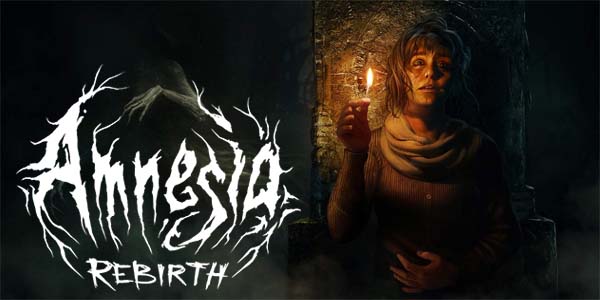
The first few minutes of Amnesia: Rebirth had me expecting much more from the game. The first game, The Dark Descent revolutionized and resurrected the horror genre after major publishers basically gave up on horror altogether, and it provided innovative new ideas that have been iterated upon by almost every horror game since. Dark Descent has the player waking up in a decrepit gothic castle and then descending into dark, atmospheric corridors in which every moving shadow, every creaking floorboard, and every gust of wind ratchets up the tension.
The oppressive light of the sun can be as threatening as the dark.
Rebirth begins with a plane crash that strands the player in the middle of the Sahara desert and prompts the player to find shade from the oppressive heat. The player knows a bit about the protagonist and the situation, it's bright and saturated in color, and is totally the opposite of how Dark Descent begins. It made me think that Rebith might further innovate the horror genre by establishing new tropes, such as using sunlight as a tool for horror instead of cliché darkness. Dark Descent had you cowering in candlelight to restore your sanity after a trek through the darkness. Maybe Rebirth would invert that mechanic and have you seeking the dark, cool corners of the map to escape the parching heat of the sun?
Well, that idea kind of goes out the window when you take shelter in a dark cave about two minutes into the game. After this introductory chapter, it's mostly just back to the same tricks as the first game, except without the expert pacing and subtle atmospheric tension and mystery.
Five minutes after wandering into that cave, I travel through a glowing portal in the walls and step into a hellish Lovecraftian otherworld. There's no build-up to it. No anticipation. Just BAM! portal to alien landscape! Explore for a few minutes, then back to the dark caves. Rebirth kind of blows its load right here at the start by introducing the player to this otherworld right away. I guess you could say that visiting the Lovecraftian otherworld is a natural progression from the first game, which only hinted at such a world's existence, but geez, let us wonder about it for a bit before you show it to us.
Five minutes into the game, and Amnesia: Rebirth blows its load with a Lovecraftian otherworld.
Showing off the goods too much and too soon then becomes a recurring theme throughout the game. My first encounter with the monster had it grab me and hold me up in front of its face for a good 5 or 10 seconds, giving me a good, long look at its well-lit, un-inspired visage. The monster from the original game was usually glimpsed through fog or darkness, and its unnatural proportions and distorted face and jaw made me wonder if I was looking at a person or not. And when I finally did start to get better looks at it much later in the game, it revealed itself to be an instantly-identifiable, iconic monster wholly unique to Amnesia. It wasn't just some generic-looking ghoul, which is sadly the case with Rebirth's monster. [More]
dacd5eb4-a39b-47df-96c5-209cc9ef3cd5|1|5.0
Tags:Amnesia, Amnesia: Rebirth, Amnesia: the Dark Descent, Amnesia: a Machine for Pigs, Frictional Games, horror, survival horror, light, fear, monster, physics, puzzle
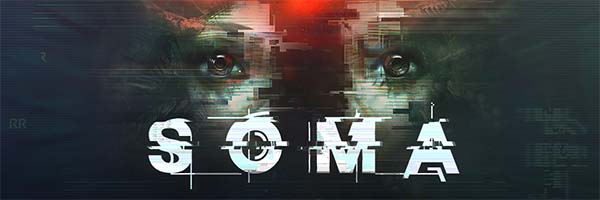
Now that I've gotten through the gauntlet of massive AAA releases like Metal Gear Solid V and Dark Souls III, I wanted to take some time to clear out some smaller games that have been collecting dust in my Steam library before diving into any other massive, time-sucking games. One of my highest priorities was the Indie sci-fi horror title Soma, developed by Frictional Games - the same company that made Amnesia: the Dark Descent. I had heard pretty good things about this game, and I liked Dark Descent, so I was eager to finally have a chance to dive into this one.
Learning from failures and forgetting successes
Soma show signs of learning from the weaknesses of both The Dark Descent and A Machine for Pigs (which was actually developed by a third party), even though it still doesn't necessarily nail the mechanics this time either. It's a far better experience than Machine for Pigs, and shows the level of quality that helped make Dark Descent such a hit. The most notable improvements from Machine for Pigs is in the depth of gameplay and monster encounters; and the most notable improvements from Dark Descent are in puzzle design and narrative.
Second chances
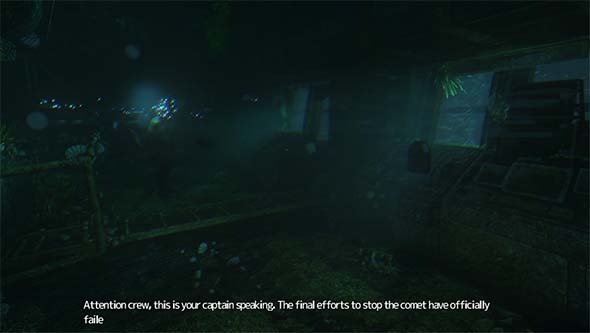
Monsters sometimes appear in where you get important story bits to incentivize you to not just walk away.
Monster encounters do still feel very un-threatening for the first half of the game. The first few monster encounters even seemed scripted to catch the player. This was possibly done in order to tutorialize the game's healing mechanic, but it also serves to desensitize the player to the monster and the threat of death right out of the gate. Unlike The Dark Descent, you don't start out terrified and cowering in fear from a mysterious and ominous enemy that can kill you in a heartbeat, and then gradually grow desensitized to it as it kills you and you realize that the consequences of death are pretty minor. Instead, you're taught right from the start that dying is virtually consequence-free, and that it isn't really worth the time and effort to try to avoid the monster by sneaking around, or to try to hide from it. The monster's appearance is never even surprising either. There's a screen-tearing effect and static noises to indicate that the monster is near, even if you can't see him. It's the same kind of effect that Slenderman played with. So even while you're walking around, you never feel the need to peek around corners or glance over your shoulder to make sure nothing's stalking you. This kills any potential for horror that the game might have been able to establish... [More]
fe37316f-173d-463b-a214-2d614c72dff2|1|5.0
Tags:Soma, Frictional Games, Steam, indie gaming, mind, consciousness, mind-body problem, transhumanism, robot, artificial intelligence, ocean, abyss, Amnesia: the Dark Descent, Amnesia: a Machine for Pigs, The Swapper, science fiction, Philip K. Dick, Turing Test, ludonarrative
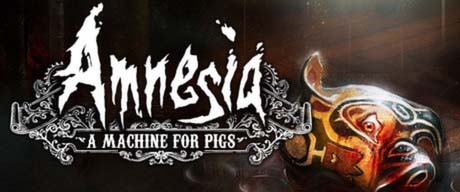
Is Frictional Games working on a new IP? I'm a bit curious as to why they outsourced development of the aptly-named A Machine for Pigs to the third-party developer The Chinese Room. Frictional's staff did stay on as "producers" for this game, so I'm sure that the final product is still consistent with what Frictional would have wanted if they had developed it themselves, and I think the overall story was still written by people at Frictional (but I could be wrong on that account). In any case, the change in development team has certainly had a dramatic effect on the way that the new game plays. The very core gameplay of exploring a linear dungeon with a flashlight is retained, but all the mechanics and the underlying feel of the game are completely different than its predecessor. This isn't necessarily a bad thing, as Amnesia: the Dark Descent wasn't perfect.
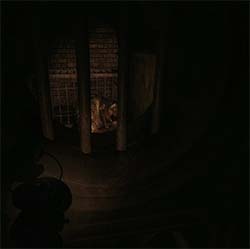
Once again, the underlying premise that sets up Amnesia: a Machine for Pigs is that your character wakes up in a mansion with no memory of who he is or why he is there. Your early exploration of the mansion reveals some vague threat, and you are forced to descend into a deep dungeon in order to discover who you are and resolve the threat. Along the way, you'll encounter deformed creatures and collect notes and documents from your former self explaining the situation, as well as have the occasional hallucinatory flashback as your memory slowly returns. But if you're worried that this sounds too much like the previous game, then fear not: A Machine for Pigs takes an entirely different approach to the gameplay and has a totally different feel to the entire experience. [More]
d070d945-e6da-4541-a97f-8240050b5cc7|1|4.0
Tags:Amnesia: a Machine for Pigs, Amnesia: the Dark Descent, review, the Chinese Room, Frictional Games, Steam, Victorian, England, industrial, survival, horror, survival horror, mansion, amnesia, Battle of the Somme, Silent Hill, Silent Hill Shattered Memories, Resident Evil, checkpoint, indie gaming
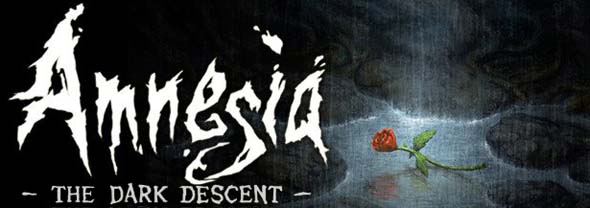
Since Silent Hill Downpour failed miserably to scratch my survival horror itch, I’ve been looking for something else to fill that niche. I picked up Amnesia: the Dark Descent on a Steam sale for pocket change, and am very glad that I did.
Mainstream game companies don’t seem particularly interested in releasing good survival horror games. It’s a very niche market and difficult to find mass-market appeal. Modern horror games mostly ape off of Resident Evil 4 by being designed as an action shooter first, and survival horror game second (if at all). The genre is dominated by fast-paced "boo"-scare games like Dead Space and F.E.A.R., and gone are the days of the deliberately-slow-paced psychological games like Silent Hill 2 and Fatal Frame. The "survival" element has mostly fallen away since resource management is widely regarded as too tedious, and the "horror" is usually just represented with difficult combat.
But where mega-publishers and AAA developers have dropped the ball, the Indie market filled in the gap 3 years ago (Sept 2010) with Amnesia: the Dark Descent.
Amnesia goes to the opposite extreme as Resident Evil 4 and Dead Space. This game is not an action game. [More]
dcd7f8cf-6f87-43f5-bf47-23ebe40b5ba4|3|4.7
Tags:Amnesia: the Dark Descent, Frictional Games, Steam, PC, H.P. Lovecraft, review, steampunk, survival, horror, survival horror, macabre, amnesia, sanity, Silent Hill Downpour, Silent Hill Shattered Memories, Dead Space, Resident Evil 4, Eternal Darkness, checkpoint, indie gaming
|

| 12 | | | | | | | 60 | | 11 | | | | | | | 55 | | 10 | | | | | | | 50 | | 09 | | | | | | | 45 | | 08 | | | | | | | 40 | | 07 | | | | | | | 35 | | 06 | | | | | | | 30 | | 05 | | | | | | | 25 | | 04 | | | | | | | 20 | | 03 | | | | | | | 15 | | 02 | | | | | | | 10 | | 01 | | | | | | | 05 |
|